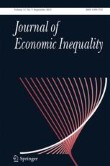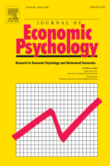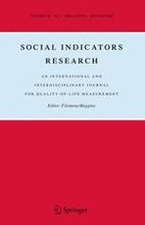Aktuelle Publikationen
Parental time restrictions and the cost of children: insights from a survey among mothers (Borah, Knabe, Pahlke)
Neue Publikation von Melanie Borah, Andreas Knabe und Kevin Pahlke:
|
An important aspect when analyzing economic inequality between households with children is time. At given monetary incomes, the material well-being of families may be very different depending on how much time parents have at their disposal. In this paper, we provide estimates of the subjectively perceived cost of children depending on the extent of parental time restrictions. Building on a study by Koulovatianos, Schröder and Schmidt (J. Bus. Econ. Stat. 27:42–51, 2009) that introduces a novel way of using subjective income evaluation data for such estimations, we conduct a refined version of the underlying survey, focusing on young women with children in Germany. Our study confirms that the perceived monetary cost of children is substantial and increases with parental nonmarket time restrictions. The experienced loss in material living standards associated with supplying time to the labor market is sizeable for families with children. Finden Sie die Publikation hier. |
 |
Replication: Emotional well-being and unemployment – Evidence from the American time-use survey (Hoang, Knabe)
Neue Publikation von Thi Truong An Hoang und Andreas Knabe:
|
We use data from the well-being module of the American Time-Use Survey (ATUS) 2010–2013 to reexamine the relationship between unemployment and emotional well-being. We replicate two previous studies (Krueger & Mueller, 2012; Dolan, Kudrna, & Stone, 2017) which have produced differing findings on this relationship, and analyze what factors cause the differences in their outcomes. We find that the results critically depend on the definition of employment statuses and the choice of well-being measure. The unemployed appear sadder and more in pain than the employed, but no other emotion queried in the ATUS has worse values for the unemployed than for the employed. Aggregate emotional well-being measures suggest that unemployment is not negatively related to emotional well-being. Applying a wider instead of narrow definition of unemployment tends to result in better emotional well-being scores for the unemployed, mainly because job leavers and new or re-entrants into the labor market report better emotions than the group of people who are unemployed due to an involuntary job loss. Finden Sie die Publikation hier. |
 |
Time Use, Unemployment, and Well-Being: An Empirical Analysis Using British Time-Use Data (Hoang, Knabe)
Neue Publikation von Thi Truong An Hoang und Andreas Knabe:
|
We use nationally representative data from the UK Time-Use Survey 2014/2015 to investigate how a person’s employment status is related to time use and cognitive and affective dimensions of subjective well-being. We do not find clear indications that employed and unemployed persons experience different average levels of emotional well-being when they engage in the same kinds of activities. For the employed, working belongs to one of the least enjoyable activities of their day. They also spend a large share of their time at work and on work-related activities. The unemployed, instead, spend more time on leisure and more enjoyable activities. When looking at duration-weighted average affective well-being over the entire waking time of the day, the unemployed experience, on average, more enjoyment than the employed. For the employed, the more hours they have to work on a specific day, the lower the average enjoyment they experience on that day. Differentiating the analyses by weekdays and weekends supports the finding that being able to freely allocate one’s non-work time is associated with higher levels of affective well-being. In line with previous studies on cognitive well-being, we find that the unemployed report substantially lower levels of life satisfaction than the employed. Finden Sie die Publikation hier. |
 |
Unlucky at work, unlucky in love: job loss and marital stability (Keldenich, Lücke)
Neue Publikation von Carina Keldenich und Christine Lücke:
|
This paper analyses the relationship between a husband’s job loss and marital stability, focusing on involuntary employment terminations due to plant closures or dismissals. Using discrete survival analysis techniques on data from the German Socio-Economic Panel, we find plant closures and dismissals to be associated with a 54 and 74% higher risk of marital dissolution respectively, though the strength of association varies significantly by how long ago the change in employment status occurred. We extend the previous literature by considering heterogeneity in the relationship depending on whether new employment was found. Our analysis shows that the dissolution risk remains elevated even in couples where the husband has taken up a new position. Surprisingly, the relative risk of dissolution following the first period in a new job after a job loss is about the same as the relative risk of dissolution following the first period without employment. The relationship between finding a new job and marital dissolution appears to be mediated by changes in working hours as well as wages. In two extensions, we also consider the role of the wife’s employment status in moderating the relationship and show that a wife’s job loss is not associated with a similar increase in the probability of divorce as a husband’s. Finden Sie die Publikation hier. |
 |
Social Indicators Research: "Estimating Extended Income Equivalence Scales from Income Satisfaction and Time Use Data" (Borah)
Neue Publikation von Melanie Borah:
|
In this paper, I estimate extended income equivalence scales from income satisfaction and time-use data contained in the German Socio-Economic Panel. Designed to capture the needs of additional household members, these scales account for both, increases in households’ money income and domestic production requirements. The estimation procedure determines equivalence weights in these two components separately by combing the subjective with the objective approach. The findings suggest greater monetary equivalence weights for adults than for children, whereas household production increases more strongly in the number of children than in the presence of an adult partner. Differences in relative needs tend to balance out in the extended income equivalence scale, assigning additional adults and children almost identical weights of about 45%. I illustrate the implications of these estimates for measures of income inequality using the same dataset. Finden Sie die Publikation hier. |
 |





